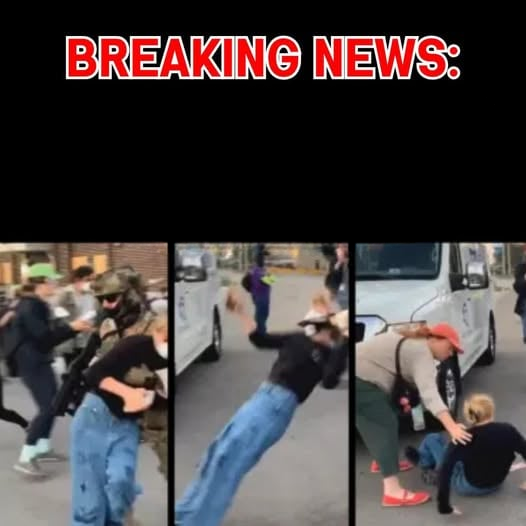What began as a quiet Friday morning in suburban Chicago exploded into turmoil when federal immigration agents clashed with demonstrators outside a disputed government facility. Within moments, the peaceful protest escalated into chaos, culminating in the removal and temporary detention of Democratic congressional candidate Kat Abughazaleh. The confrontation, captured on dozens of cell phones, quickly went viral—igniting fierce national debate over immigration enforcement and the right to dissent.
Witnesses described the scene as tense and unpredictable. Protesters, many carrying handmade signs and chanting in solidarity with detained immigrants, formed a human blockade to stop federal vehicles from leaving the area. When agents in tactical gear advanced, pushing through the crowd, shouting erupted and panic followed. What was meant to be a symbolic act of defiance became a flashpoint that laid bare deep divisions over immigration policy.
Kat Abughazaleh, the 26-year-old congressional hopeful at the center of the incident, had been speaking to demonstrators moments before the confrontation began. According to multiple accounts, she positioned herself between protesters and ICE agents, urging calm while standing firm in opposition. Videos circulating online show agents physically removing her from the scene, sparking outrage and condemnation from activists and political allies alike.
The Immigration and Customs Enforcement (ICE) processing facility in Broadview, Illinois, where the clash occurred, has long been a lightning rod for controversy. Though officially classified as a short-term holding center, designed to detain individuals for no more than 12 hours before transfer, critics allege the site routinely violates its own mandate. They claim Broadview functions as a de facto detention center, where people endure prolonged confinement.
Activists and advocacy groups have documented disturbing conditions inside the Broadview facility. Reports describe detainees forced to sleep on concrete floors without access to adequate food, water, or medical care. Allegations of overcrowding and mistreatment have fueled anger for years, making the site a powerful symbol in the broader movement calling for immigration reform and humanitarian accountability.
Friday’s demonstration had been planned as a peaceful act of resistance. Local faith leaders, students, and immigrant families gathered with candles, banners, and prayers for those facing deportation. Yet within an hour, the atmosphere shifted dramatically as agents ordered the crowd to disperse. When protesters refused, tensions flared, and the standoff transformed into a national spectacle.
Abughazaleh’s campaign team issued a statement later that afternoon, condemning the use of force and reaffirming her commitment to stand with immigrant communities. “Peaceful protest is a cornerstone of democracy,” the statement read. “No individual should be treated as a threat for exercising their constitutional rights.” The campaign vowed to continue advocating for transparency and humane immigration practices.
Federal officials defended their response, claiming protesters had unlawfully obstructed government operations and endangered public safety. A spokesperson for ICE insisted that the agents acted in accordance with protocol after demonstrators refused repeated orders to clear access routes. “Our responsibility is to maintain security,” the agency stated, “not to silence lawful dissent, but to ensure safety for all.”
The conflicting narratives highlight the growing rift between law enforcement agencies and immigration advocates. For some, the Broadview confrontation underscores the government’s heavy-handed tactics and disregard for civil liberties. For others, it represents the difficult balance between maintaining order and respecting the rights of protesters. Both sides now find themselves entrenched in an increasingly polarized national conversation.
Across social media, clips of the altercation spread rapidly, drawing millions of views within hours. Supporters of Abughazaleh hailed her as a symbol of courage, while critics accused her of using the moment for political gain. The footage, however, left little room for neutrality—its rawness forcing Americans to confront uncomfortable questions about power, protest, and principle.
As the dust settled, community organizers pledged to continue their demonstrations, vowing not to let fear or arrests silence their voices. “This is bigger than one protest,” said a local activist. “This is about human dignity and accountability.” The sentiment echoed through candlelight vigils held across Chicago that evening, where chants for justice mingled with prayers for peace.
What began as a small demonstration outside an unassuming facility has now evolved into a defining political moment. For Kat Abughazaleh, the events of that morning could reshape not only her campaign but also the national dialogue surrounding immigration. And for the country watching, Broadview has become more than a place—it’s a mirror reflecting the tension, conviction, and conscience of a divided America.
